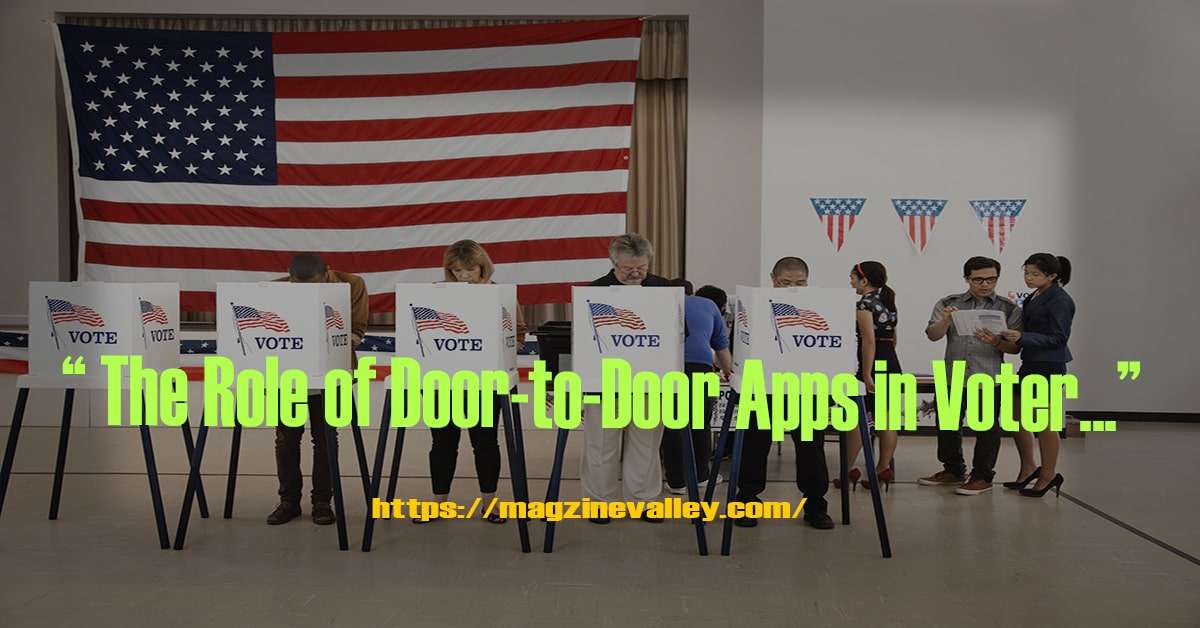Lifestyle
The Role of Door-to-Door Apps in Voter Engagement

In an era where technology intertwines with every aspect of our lives, it comes as no surprise that it plays a pivotal role in voter engagement as well. Door-to-door apps have emerged as a powerful tool in political campaigns, revolutionizing the way candidates connect with voters. This article explores the significance of door-to-door apps in voter engagement, delving into their impact on modern campaigning strategies and their potential to shape the future of democracy.
Transforming Traditional Campaigning Methods
Traditionally, political campaigns heavily relied on face-to-face interactions to sway voter opinions and garner support. Volunteers would canvas neighborhoods, knocking on doors, and engaging in conversations with residents. While this method remains effective, it is time-consuming and resource intensive. Door-to-door apps have revolutionized this approach by digitizing and streamlining the canvassing process.
These apps empower volunteers and campaign staff by providing them with comprehensive voter data, including demographic information, voting history, and issue preferences. Armed with this data, canvassers can tailor their interactions to resonate with each voter, effectively delivering targeted messages that address individual concerns. Moreover, these apps offer built-in tools for data collection and analysis, enabling campaigns to track their progress, identify trends, and refine their strategies in real-time.
Enhancing Accessibility and Reach
One of the most significant advantages of door-to-door apps is their ability to enhance accessibility and reach. In the past, geographical constraints limited the scope of traditional canvassing efforts. However, with the advent of door-to-door apps, campaigns can transcend these boundaries and engage with voters on a much broader scale.
These apps enable volunteers to conduct virtual canvassing from anywhere, eliminating the need for physical presence in target neighborhoods. Furthermore, they facilitate multilingual communication, allowing campaigns to connect with voters from diverse linguistic backgrounds. By breaking down barriers to engagement, door-to-door apps ensure that every voter has the opportunity to participate in the democratic process, regardless of their location or language proficiency.
Facilitating Personalized Engagement
Personalization is key to effective voter engagement, and door-to-door apps excel in this regard. By leveraging advanced data analytics and machine learning algorithms, these apps enable campaigns to segment voters based on various criteria, such as demographics, interests, and behavior. Armed with this information, canvassers can craft personalized messages and outreach strategies tailored to the unique preferences of each voter.
Moreover, door-to-door apps facilitate ongoing communication between campaigns and voters, allowing for sustained engagement beyond the initial interaction. Through features such as push notifications and email campaigns, campaigns can keep voters informed about upcoming events, policy updates, and relevant news. By fostering a sense of community and belonging, these apps cultivate long-term relationships with voters, fostering trust and loyalty towards the candidate or party.
Overcoming Challenges and Ethical Considerations
While door-to-door apps offer numerous benefits, they also present certain challenges and ethical considerations. One concern is data privacy and security, as these apps collect and store sensitive information about individual voters. Campaigns must ensure compliance with relevant regulations, such as the General Data Protection Regulation (GDPR) in the European Union, to safeguard voter data and uphold privacy rights.
Another challenge is the digital divide, which refers to disparities in access to technology and internet connectivity among different socioeconomic groups. While door-to-door apps have the potential to enhance voter engagement, they may inadvertently exclude marginalized communities who lack access to smartphones or reliable internet access. Campaigns must adopt inclusive strategies to ensure that all voters have equal opportunities to participate in the electoral process.
Furthermore, there are concerns about the potential for manipulation and misinformation on digital platforms. Door-to-door apps can be vulnerable to exploitation by bad actors seeking to spread false information or manipulate public opinion. Campaigns must implement robust security measures and fact-checking protocols to combat misinformation and maintain the integrity of their outreach efforts.
The Future of Voter Engagement
Despite these challenges, the role of door-to-door apps in voter engagement is likely to continue evolving in the years to come. As technology advances and becomes more ingrained in our daily lives, campaigns will increasingly rely on digital tools to connect with voters and mobilize support. However, it is essential to strike a balance between leveraging technology for outreach and ensuring that no voter is left behind.
Looking ahead, door-to-door apps have the potential to revolutionize the way we think about democracy and civic engagement. By harnessing the power of data-driven insights and personalized communication, campaigns can build stronger connections with voters and foster a more inclusive and participatory political landscape. As we navigate the complexities of the digital age, it is crucial to harness technology responsibly and ethically to uphold the principles of democracy and ensure that every voice is heard.